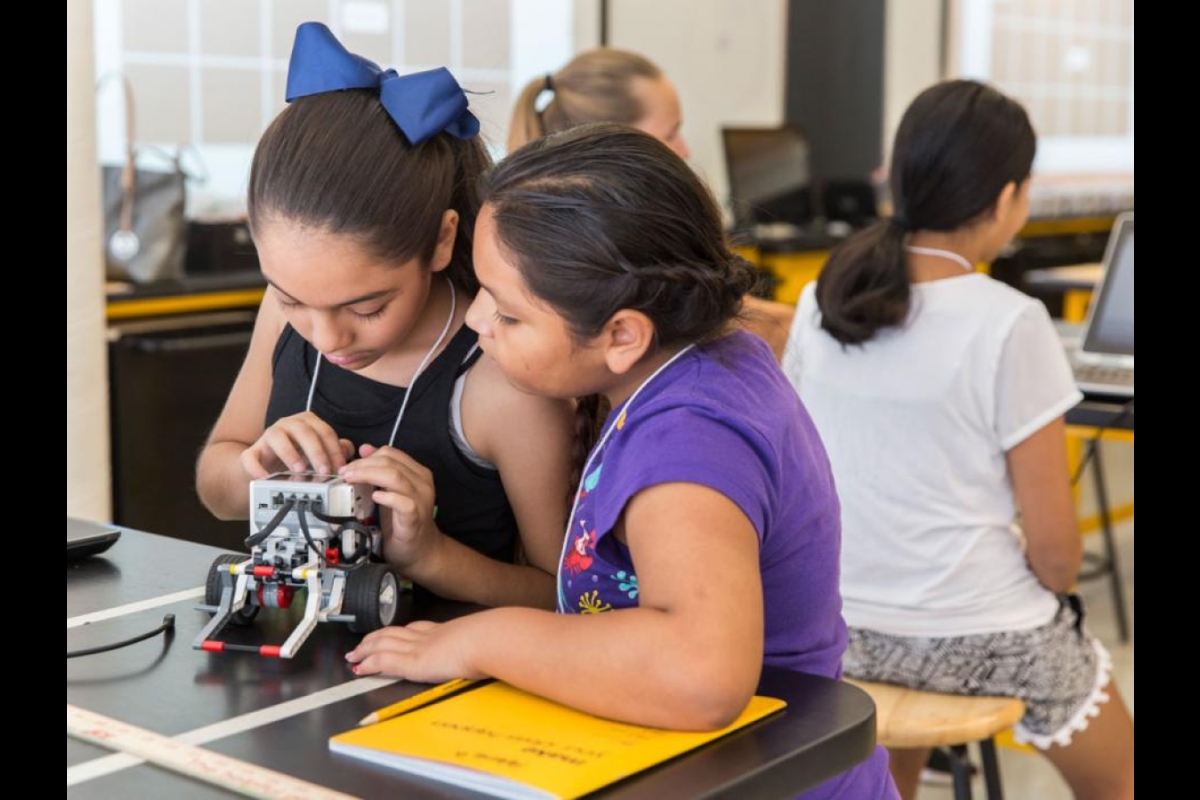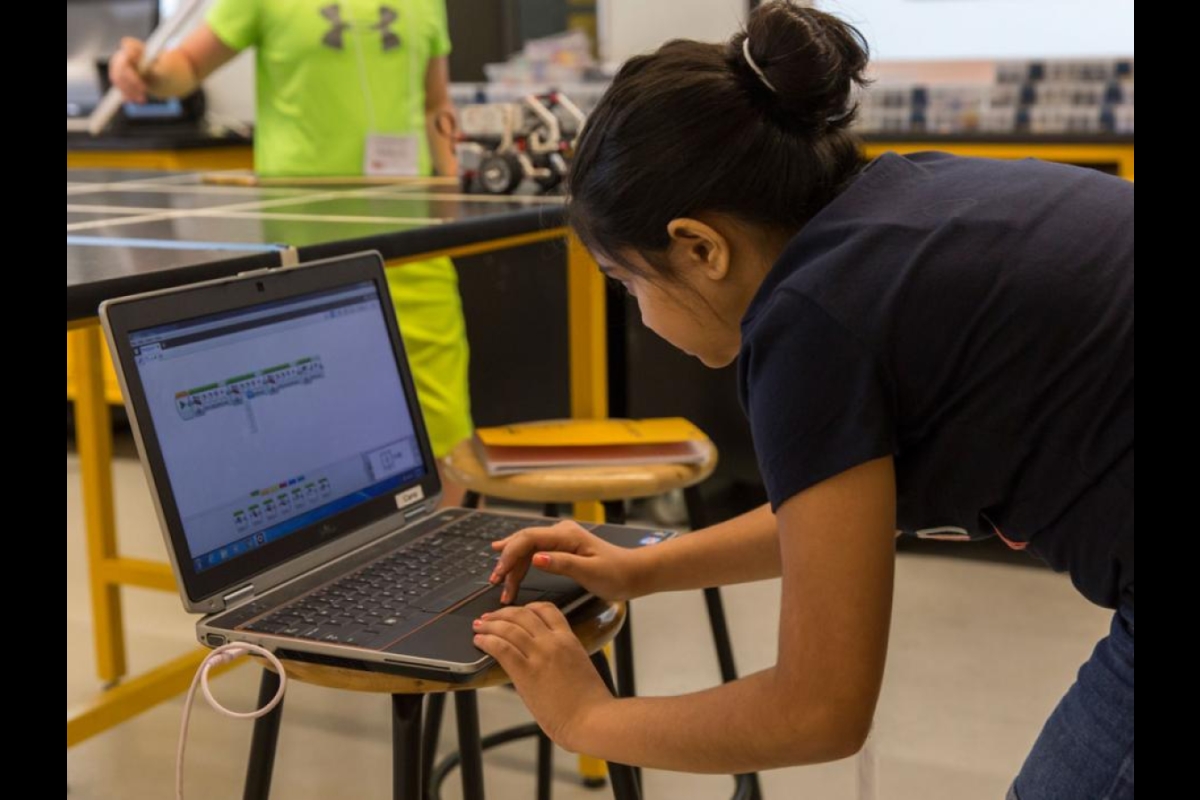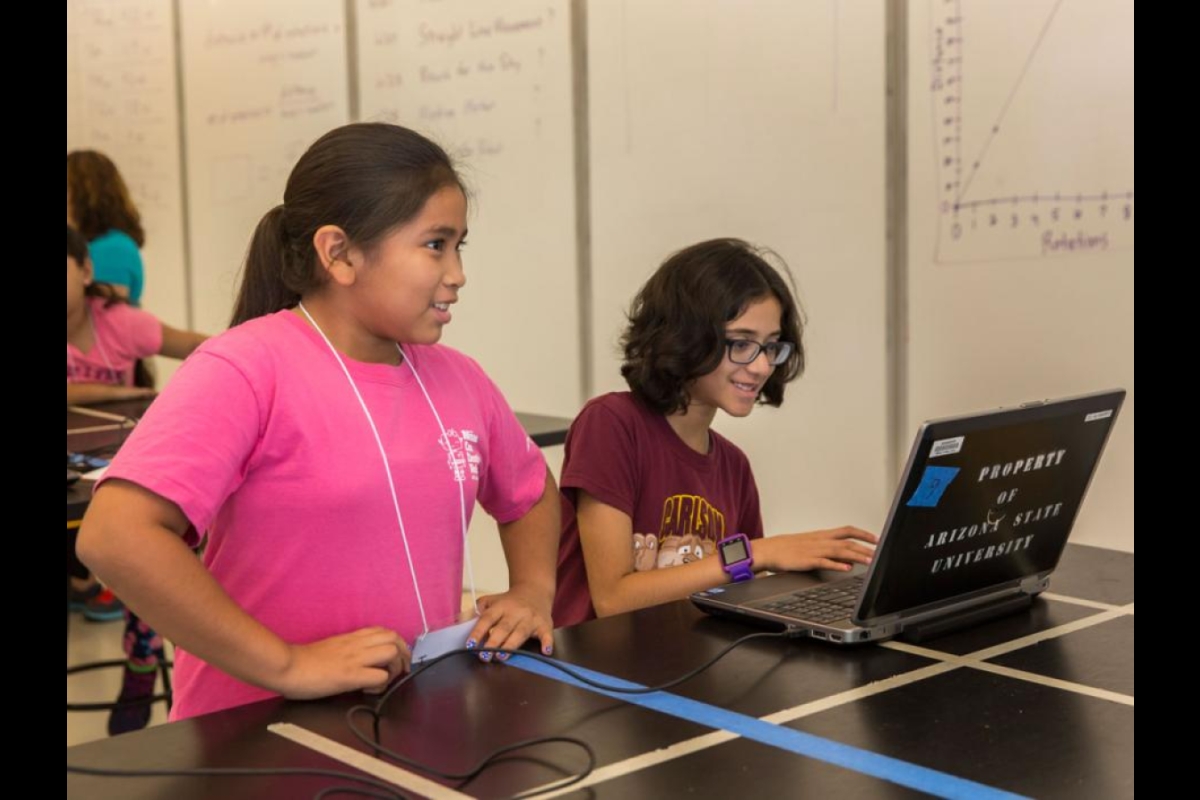Young girls branch out into STEM at ASU LEGO camp

FIRST LEGO League summer introductory programs are week-long, full-day camps that teach the basics of robotic programming. Students build and program an autonomous LEGO MINDSTORMS EV3 robot to complete a variety of tasks ranging from simple movement to those involving logic and sensors. Photographer: Nick Narducci/ASU
A din of discussion, pencil-scribbling, keyboard-clacking and motor-whirring fills one of the engineering eSpaces at Arizona State University. Instead of the usual college students, it’s 16 girls entering fourth through eighth grade this fall. In teams of two, they’re trying to program a series of commands to get robots to drive themselves from various starting points to a finish point using environmental cues.
It’s not an easy task for these students, many of whom are getting their first lesson in programming and logic, but they’re up for the challenge of directing the robots’ motors and sensors.
“It’s cool to get them to strategically employ sensors to solve the problems,” said instructor Erik Von Burg, a teacher for the Mesa School District.
Team by team, happy dances and high-fives erupt across the room as they solve the challenge.
“It’s the most fun thing I’ve done this summer,” said Alysson Brown, 11, of the introduction to a FIRST LEGO League (FLL) weeklong girls’ camp where she had her first taste of robotics.
Using robots to teach kids STEM
FIRST (For Inspiration and Recognition of Science and Technology) is an international organization founded by entrepreneur and inventor Dean Kamen that aims to motivate and prepare students to pursue science, technology, engineering and math education and careers.
“FIRST provides students an opportunity to really think about STEM and being STEM leaders as young as age 5 and continue that growth through high school opportunities and then think about it as a career opportunity for the future,” said FIRST LEGO League’s partner services manager Kathy Vachon.
In ASU’s summer FIRST LEGO League programs, students learn robotic programming by building and programming an autonomous LEGO MINDSTORMS EV3 robot and LEGO’s visual-block-based programing software.
Along with introductory summer programs, students can also participate in yearlong FLL competition programs, which include FIRST LEGO League Jr., FIRST LEGO League, FIRST Tech Challenge and FIRST Robotics Competition.
All programs seek to provide a foundation for a future in STEM.
“Our goal is for students to not only have fun with robots, but to see the larger role those robots play in their academic and professional careers, and make the connection between FLL and their abilities to become successful engineers or other STEM professionals,” said Hilary Mitchell, senior coordinator for the FIRST LEGO League and FIRST LEGO League Jr. at ASU’s Ira A. Fulton Schools of Engineering K-12 Engineering Outreach Department. “Every day through the FLL program children become empowered to continually challenge themselves, persistent in their efforts to grow.”
ASU’s involvement with FLL is also growing. After the Fulton Schools began managing the Arizona branch of FLL eight years ago, the STEM education outreach program’s participation has experienced rapid growth.
This year the FLL summer introductory camps are near capacity at 95 registered students for six camps — a 30 percent increase since last year when they launched.
Engineering is for everyone
ASU also wants to foster a diverse group of engineers for the future. Through extensive outreach with FLL programs, ASU strives to empower women and other underrepresented groups in STEM.
Vachon says FLL’s partnership with ASU and the Fulton Schools benefits greatly from the university’s statewide outreach.
“The Fulton Schools goes out into all areas of Arizona regardless of social or economic experiences for students and provides an opportunity for them to participate in FIRST LEGO League programs,” Vachon said.
The ASU summer introductory programs help girls in particular break down the barriers to STEM through project-based learning. They can participate in girls-only camps or mixed-gender camps.
Overall, campers are nearly 50 percent young women, with mixed-gender camps having 25 percent to 40 percent female campers.
Von Burg, who has coached and mentored FLL teams since 2008, has a 7-year-old daughter he sometimes brings to camp to show her other girls engaged in engineering.
“I want to have her see girls diving in and enjoying programming and engineering activities,” he said.
Brown, as well as her teammate Monica Juarez and friends Keya Kotagiri and Aria Raman all enjoyed building the robots and programming them to solve the challenges.
“It’s difficult to program [the robot] correctly, but I’m really proud of being able to figure out that I can program and read the program so I can fix a problem and try it again,” Juarez said.
This learning experience often becomes a jumping-off point for more STEM programs. Mitchell said many campers sign up for a second introduction camp or an intermediate camp the following summer, or even year-long FLL team competitions.
“The summer camp is designed to not only introduce campers to the world of robotics, but also help them experience what FLL is like,” Mitchell said. “Many campers and their parents find an easy transition into starting their own FLL teams."
Learning skills for any path ahead
STEM concepts aren’t the only focus for FIRST. Its programs also largely teach core values that emphasize more general skills such as teamwork, creativity, problem solving and appreciation for learning.
While some girls already had plans for a career in STEM, others may get interested in STEM careers as they participate in FLL programs or they may take different paths. Raman wants to be a mathematician or a programmer like her dad when she grows up; Brown and Juarez want to go into the medical field as a veterinarian and pediatrician. Kotagiri has different plans. Though she loves math, Kotagiri has aspirations to be a lawyer, and FLL’s emphasis on core values aims to promote success in any career path.
“In our core values, we talk about 21st century skill-building,” Vachon said. “Students can look at a real-world solution and use innovation to problem-solve.”
Von Burg teaches critical thinking and problem-solving skills that could be helpful in a variety of fields.
“Stuff you know isn’t going to get you in trouble, and stuff you know you don’t know isn’t going to get you in trouble,” Von Burg said in a lesson. “Stuff you don’t know you don’t know gets you in trouble. We should question what we know and what we don’t know.”
Figuring out what you don’t know, learning from wrong answers, and trying what might not work and seeing what happens are valuable engineering skills as well as general problem-solving skills, he said.
Even if the 16 girls in the intro class and others attending FLL summer programs don’t become engineers, they’ve been exposed to the field on a college campus.
Some may even choose to attend ASU in the future.
“I’m so going to ASU,” Brown said as she and her friends were off to get lunch at the Memorial Union.
More Science and technology

ASU-led space telescope is ready to fly
The Star Planet Activity Research CubeSat, or SPARCS, a small space telescope that will monitor the flares and sunspot activity…

ASU at the heart of the state's revitalized microelectronics industry
A stronger local economy, more reliable technology, and a future where our computers and devices do the impossible: that’s the…

Breakthrough copper alloy achieves unprecedented high-temperature performance
A team of researchers from Arizona State University, the U.S. Army Research Laboratory, Lehigh University and Louisiana State…




